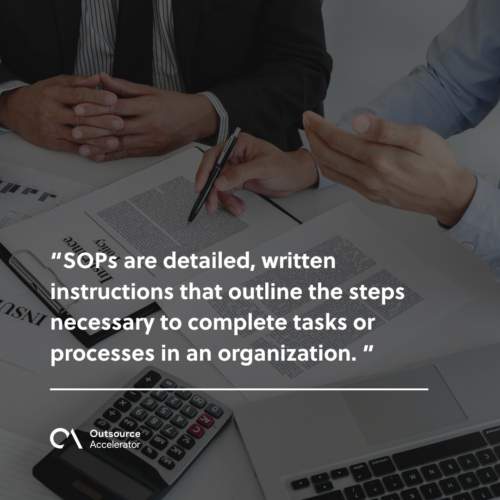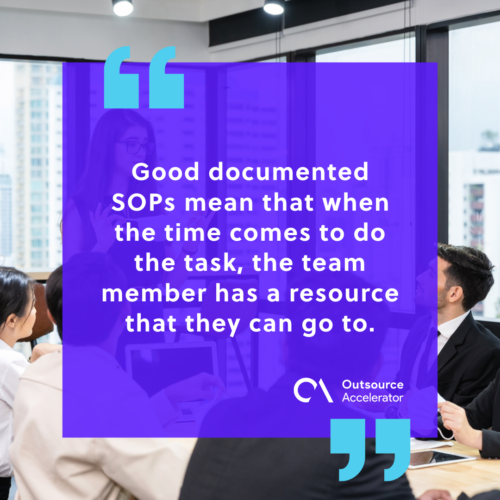The importance of Standard Operating Procedures (SOPs) for outsourcing companies

Efficiency, consistency, and compliance are critical to staying competitive when outsourcing. One of the most powerful tools that companies can use to streamline their operations is the Standard Operating Procedure (SOP).
SOPs are detailed, written instructions that outline the steps necessary to complete tasks or processes in an organization. They ensure that operations are executed consistently and to the same high standard, regardless of who performs them.
This article examines the importance of SOPs and their key elements and provides insights on how to implement them effectively.
In the 507th episode of the Outsource Accelerator Podcast, Trust the Process CCO Ben Shipley describes how processes and SOPs help form the foundation of successful operations.
What are Standard Operating Procedures (SOPs)?
Standard Operating Procedures, commonly referred to as SOPs, are structured documents that provide step-by-step instructions for carrying out specific tasks or operations.
They act as a guide to ensure that everyone within an organization follows a standardized method for completing processes. They effectively minimize variability, enhance quality, and ensure compliance.

SOPs are crucial in the context of outsourcing because they provide clarity and uniformity in the way tasks are executed.
Outsourcing companies handle a wide range of processes across different clients and industries. A well-documented SOP ensures that the tasks are performed consistently, regardless of the employee or location.
When it comes to good processes, Ben says, “When you’ve got something that’s nice and repeatable, then you can get massive returns and efficiencies, particularly in relation to costs.”
SOPs also help bridge any gaps in communication or expectations between the outsourcing provider and the client. They ensure that both parties are aligned on deliverables and quality standards.
Key elements of effective SOPs
Creating an effective SOP is more than just documenting a series of steps. It requires careful planning, clear language, and continuous improvement.
Here are the key elements that make SOPs successful in an outsourcing environment:
1. Clear objectives
All SOPs should begin by defining the procedure’s purpose. This provides context to the task and helps team members understand the importance of following the steps.
2. Detailed step-by-step instructions
The heart of an SOP is its ability to break down a task into manageable and understandable steps. Each step should be described in detail so that it can be easily followed without any assumptions.
Ben says that his team can create little processes to cover any role.
“It’s mostly just about making it simple and accessible for the person who’s going to do the work to go back and find that information.”
3. Roles and responsibilities
A well-written SOP specifies who is responsible for each part of the process. This helps clarify accountability and prevent confusion about who should be doing what.
4. Consistency in formatting and language
SOPs should follow a consistent format and use simple, straightforward language. This ensures that all team members, regardless of their background or location, can easily understand and implement the instructions.
5. Review and update schedule
Processes and technologies evolve, and so should SOPs. A strong SOP will include a review schedule to ensure that the document remains relevant and up to date with current best practices or changes in operations.
Ben remarks that this is a key part of delegating tasks rather than abdicating them.
“[When] you’re giving something that is a process, and you can inspect it and support and do all those things, [that’s] when somebody else other than you doing it will actually work.”
Why do outsourcing companies need SOPs?
Outsourcing companies operate in a highly dynamic and competitive environment. Their ability to deliver high-quality services consistently while managing a diverse client base depends largely on the implementation of effective SOPs.
Here are the primary reasons why SOPs are essential for outsourcing companies:
Ensuring consistency in service delivery
One of the greatest challenges for outsourcing companies is maintaining uniformity across different teams, shifts, and geographic locations.
SOPs provide a standardized approach to task completion, which ensures that the same level of quality is maintained no matter who is performing the job.
Enhancing efficiency and productivity
SOPs eliminate ambiguity in workflows by outlining clear processes, reducing the time employees spend figuring out what needs to be done.
With clear instructions, team members can focus on executing tasks efficiently and productively.
Compliance with industry standards
Many outsourcing companies handle sensitive information or operate in regulated industries. SOPs help ensure that all tasks are carried out in compliance with industry regulations and client requirements, minimizing the risk of penalties or legal issues.
Facilitating training and onboarding
Employee turnover is high in the outsourcing industry. QATC reported that average turnover ranged between 30-45%.
Having detailed SOPs is invaluable for onboarding new hires.
Instead of spending extensive time on training, new employees can refer to SOPs to quickly get up to speed and perform their duties confidently.
Improved client satisfaction
Clients rely on outsourcing providers to deliver results without constant oversight.
By implementing SOPs, outsourcing companies demonstrate their commitment to consistency and quality. In turn, this enhances client satisfaction and strengthens business relationships.
Implementing SOPs in outsourced workflows
Once SOPs are developed, it is essential to implement them effectively within outsourced workflows.
Here are some best practices for ensuring successful SOP implementation:
1. Involve key stakeholders in development
Involve team members who are directly responsible for executing the tasks, as they can provide valuable insights into the practical challenges and nuances of the process.
Additionally, seek feedback from clients to ensure that their expectations align with the documented procedures.
2. Train employees on SOP usage
Simply distributing SOPs is not enough. Provide thorough training to ensure that employees understand how to follow the procedures correctly.
This is especially important in outsourcing environments, where teams may be located in different regions with varying levels of expertise.
“Every time you onboard somebody, you have the opportunity to make processes,” Ben remarks.
3. Monitor and enforce adherence
Regular checks and performance reviews can help identify areas where employees may be deviating from the procedures. Management can address these issues before they impact service quality.
4. Leverage technology for SOP management
Tools such as document management systems or workflow automation platforms can help ensure that SOPs are easily accessible and up to date. This is particularly useful for outsourcing companies with multiple teams across different locations.
In this, Ben advocates for the use of documentation tools.
“Good documented SOPs mean that when the time comes to do the [task], [the team member] has a resource that they can go to.”

5. Regularly review and update SOPs
As business needs evolve, so too should the SOPs. Schedule regular reviews to ensure that the procedures remain relevant and reflect any changes in technology, client requirements, or industry standards.
In the end, Ben says that the goal is all for the benefit of their clients.
“For us, it’s less about doing all these things for clients and more about making our clients experts.”







 Independent
Independent




